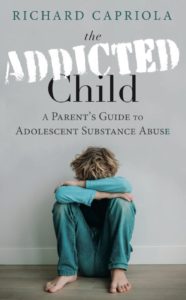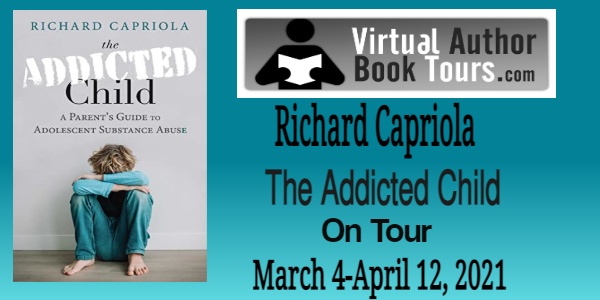
Publisher: Book Baby (November 24, 2020)
Category: Self-help, Parenting, Adolescence, Substance Abuse, Drug Dependency Recovery, & Non-Fiction
Tour dates: March-April, 2021
ISBN: 978-1-09832-728-1
Available in Print and ebook, 107 pages
Description Addicted Child by Richard Capriola
The Addicted Child is a resource for parents. It addresses adolescent substance abuse. Readers learn the extent of adolescent substance abuse in America, how drugs impact the teen brain, warning signs every family should know about, assessments and tests important for a comprehensive assessment and diagnosis, how eating disorders and self-injury can accompany substance abuse, how to recognize street drugs being used by teens, and resources to help identify treatment options.
Parents will learn from Richard Capriola, a mental health and addictions counselor, the importance of comprehensive assessments – and what to look for in a counselor to know you’re getting the right help.
Praise Addicted Child by Richard Capriola
Literary Titan Book Award (Gold) 2020
In this pragmatic and accessible text Rick Capriola has distilled the wisdom he accrued from decades of experience on the frontlines of substance use treatment. He provides a valuable resource to all parents attempting to find their bearings in the often confusing and frightening world of intertwined adolescent psychological and substance use problems.”-Major R. Bradshaw, Ph.D Department Of Psychiatry, Houston Methodist Hospital
“Rick has written an invaluable tool for parents. The Addicted Child helps parents understand how alcohol and drugs influence their child’s behavior, offers resources to help parents find effective treatment options, and explains which assessments are important for a diagnosis and the professionals that should be involved in making those assessments.”-Jamison Monroe, Founder and Chairman Of Newport Healthcare
Whilst doing research on an upcoming book I stumbled upon this newly released gem. Richard Capriola is a retired addiction counselor who has taken the time to share his extensive experience in this well-written book. The language is easy and the flow of information effortless. The book tackles the shock of parents when they first learn about their children’s drug use disorders and mental health problems, before providing the information necessary to help the parents help their children.
It describes the commonly abused drugs out there (from an US perspective) and highlights the need to look out for process disorders such as eating disorders and self-harm. Finally the book demystifies the principles for adolescent substance abuse treatment and describes available treatment approaches. In my opinion a fantastic book that is targeted towards parents that want to be better informed when it comes to drug abuse and mental health problems of their children. A must-read!”- Stephan Neff, My Steps To Sobriety
“The book hooks you right from the acknowledgment. The author tells a poignant story describing why he decided to write this book and goes on to share stories of parents who were surprised by underlying mental illnesses. This personal touch gives the book a human quality that puts the rest of the information into perspective. Any parent would benefit from this book.”-Literary Titan
Interview With Richard Capriola
TR: Please tell us about your background as a mental health and addiction counselor.
RC: My journey began in the mental health field when I was working at a reginal mental health crisis center in central Illinois. Adults were referred to the crisis center from local emergency rooms. I noticed that a large percentage of those coming to the crisis center had not only a mental health issue but also a substance abuse issue. So, I returned to the University of Illinois and obtained a master’s degree in addictions counseling. I continued working at the crisis center until I was offered a job by Menninger Clinic in Houston Texas. Menninger has a reputation of being one of the top ten psychiatric hospitals in the United States, so I accepted the job. I worked for Menninger about 11 years and treated both adults and adolescents diagnosed with substance abuse disorders. I retired from Menninger a little over a year ago and set about to write my book on adolescent substance abuse. Having met so many parents with children diagnosed with substance use disorders, I wanted to create a roadmap that might help other parents navigate through what can often be a complex and confusing issue like adolescent substance abuse.
TR: Without giving up confidentiality, can you tell us about a case you personally had? (case study)
RC: I once worked with a teenage boy who was admitted to the hospital with a history of anxiety, self-injury, marijuana abuse and alcohol abuse. He was a good example of how teens can hide their substance abuse, often right under the nose of their parents. His parents kept their liquor in an unlocked cabinet. When this young man wanted alcohol, he simply stole gin or vodka because they are clear liquids. He’d take part of the alcohol from a bottle and replace it with water. HIs parents never discovered his raiding the liquor cabinet until it was almost too late. He was an example of how so many adolescents are able to fly under their parent’s radar to use substances and parents don’t discover the use until its progressed too far.
TR: I have a confession to make. The first time I tried cannabis, I was 9 years old. After that I used it on and off a few times week throughout my childhood. I was an honor student throughout high school. That is with the exception of my geometry class I had after lunch in 10th grade. I had to use the bathroom before and it was full of girls smoking joints. I was trying to fit in at the time so had some. I cried when I received a C in that class! I never did that again and found it didn’t help me fit in anyway. Other than that, I always studied and did my homework before I indulged. What would you tell my teenaged self?
RC: I would tell you to protect your brain. The adolescent brain is a developing brain. Our brains do not get fully developed until around age 24 or 25. Using substances like alcohol or drugs can have serious consequences to a developing brain. It not only makes you more vulnerable to addiction, but it also can produce other effects. Many of the teens I worked with were smoking marijuana multiple times a day. They were very bright young men and women. Their IQ scores were above average to superior. But when their psychological tests came back, I usually found that the processing speed of their brain was below average, their short-term memory was impaired and most admitted that marijuana sapped the motivation from them. Was all this due to marijuana? Probably not. But was marijuana contributing to the decline? Probably. So, my advice is to protect your growing and developing brain.
TR: Though you are already and expert in the field, most books like this require more research. How much time and effort went into your research for the book?
RC: I spent about one year doing research for my book. I was gathering information on each of the chapters and issues in my book, including the latest information on the extent of adolescent substance abuse in the United States, information on street drugs teens use, information on types of evidence based treatment programs parents might want to explore if needed, information on what constitutes a quality program and information on eating disorders, self injury and other behaviors that often accompany alcohol and drug use.
TR: How long did it take you to complete ‘The Addicted Child’?
RC: I began thinking about writing my book for families before I left Menninger Clinic. Meeting with so many parents who were surprised by the extent of their child’s substance abuse led me to understand that most parents have not had good resources on adolescent substance abuse. I wanted to provide them with a clear, concise and easy to read and understand roadmap that would help them. After I left Menninger I set about to research and write the book. The process took about a year to complete.
TR: Tell us about your cover. Did you design it yourself?
RC: My cover was designed by the publisher after I had input into what I wanted the cover to convey. I wanted the image on the cover to show an adolescent and to convey the pain that they feel which is often undiagnosed and unrecognized by many including their own family.
TR: What would you advise parents to do that might help them keep their child away from using alcohol or drugs?
RC: First, I would ask them to buy and read a copy of my book, The Addicted Child: A Parent’s Guide to Adolescent Substance Abuse. It’s only about 100 pages but it’s packed with information and resources every parent and family should know about. It will help them understand the basics of adolescent substance abuse and the warning signs every parent should know about. Second, I would say that it’s never too late to build a strong relationship with your child that is built on open and honest communication and trust. While no child is totally protected from being caught up in substance use, having a strong relationship helps reduce the risk. Every parent can learn to build that relationship and can learn good communication skills. We are usually good at listening to our child’s words, but we need also to learn how to listen to the feelings behind those words. It’s a skill parents can master that will pay dividends. My Addicted Child workbook, also available on Amazon, is intended to help parents.
About Richard Capriola
Richard Capriola has been a mental health and addictions counselor for over two decades. He has been licensed in Illinois and Texas and has treated both adults and adolescents with substance abuse disorders.
Website: https://helptheaddictedchild.com/
Facebook: https://www.facebook.com/richard.capriola
Twitter: https://twitter.com/CapriolaRichard
Pinterest: https://www.pinterest.com/richardcapriola
Instagram: https://www.instagram.com/instarick1949/
Buy Addicted Child by Richard Capriola
Amazon
Barnes&Noble
IndieBound
Giveaway Addicted Child by Richard Capriola
This is for one print copy or pdf for 3 winners. Print is open to the U.S. only and pdf is open worldwide. This giveaway ends onApril 13, 2021 at midnight pacific time. Entries are accepted via Rafflecopter only.
Follow Addicted Child by Richard Capriola Tour
Teddy Rose Book Reviews Plus Mar4 Kickoff & Interview
Lu Ann Rockin’ Book Reviews Mar 5 Review & Guest Post
Sage Nor Bound 4 Escape Mar 8 Guest Review
Am Goodreads Mar 9 Review
Mike Goodreads Mar 10 Review
Betty Toots Book Reviews Mar 11 Review & Guest Post
Bookgirl Goodreads Mar 16 Review
Miller Amazon Mar 17 Review
Laura Lee Celtic Lady’s Reviews March 19 Guest Review & Excerpt
Andy Amazon Mar 22 Review
GudReader Goodreads Mar 26 Review
Becky Amazon Mar 30 Review
Ayesha theayeshasite Apr 6 Review
Linda Lu Goodreads Apr 7 Review
Teddy Rose Book Reviews Plus Apr 8 Review
Bee Book Pleasures Apr 9 Review & Interview
Gracie Goodreads Apr 12 Review






That’s a very interesting topic, one that every parent would want to know more about. Thanks.
Sounds fascinating
Sounds like a good resource book for parents.
[…] Teddy Rose Book Reviews Plus Mar4 Kickoff & Interview […]
This sounds like an excellent resource on this issue.
[…] Teddy Rose Book Reviews Plus Mar4 Kickoff & Interview […]